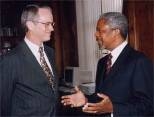The United Nations and its seventh secretary general, Sloan School alumnus Kofi Annan, were awarded the Nobel Peace Prize Friday (October 12) for striving to create "a better organized and more peaceful world" in the post cold-war era.
The Norwegian Nobel Committee said, "The UN has in its history achieved many successes, and suffered many setbacks. Through this first Peace Prize to the UN as such, the Norwegian Nobel Committee wishes in its centenary year to proclaim that the only negotiable route to global peace and cooperation goes by way of the United Nations."
Annan, 63, was appointed secretary general by the UN General Assembly in 1997 and elected to a second five-year term in June. An active alumnus, he received the SM in management in 1972 and has visited MIT several times in recent years. He delivered the commencement address in 1997.
In that speech, he said:
"When the world thinks of MIT alumni and alumnae who have gone on to assume positions of visibility in their respective fields, as so many have, it correctly imagines Nobel laureates in physics, chemistry and economics, or business tycoons, or engineers improving our daily lives in countless ways. But a secretary general of the United Nations? That's hardly the first answer anyone would blurt out on a TV quiz show!
"And yet, it is not as much of a stretch as it may seem at first. For the ethos of science and engineering shares deep and profound similarities with the 20th century project of international organization. Science and international organizations alike are constructs of reason, engaged in a permanent struggle against the forces of unreason.
Science and international organization alike are experimental; both learn by trial and error and strive to be self-correcting. Lastly, science and international organization alike speak a universal language and seek universal truths."
Annan was educated at the University of Science and Technology in Kumasi, Ghana; Macalester College in St. Paul, Minn.; and the Institut de Hautes Etudes Internationales in Geneva, before coming to MIT.
Annan, whose father was a provincial governor in Ghana and a Fante tribal chief, is married to Nane Lagergren, a Swedish artist and lawyer. His wife's uncle, Swedish diplomat Raoul Wallenberg, helped thousands of Hungarian Jews escape from the Nazis during World War II. The Annans have three children.
A career UN diplomat, Annan speaks English, French and several African languages. When told about the Peace Prize, Annan said, "It is humbling. It's great recognition for the staff."
This modesty and humility would not surprise his Sloan School classmates in 1971-72. In 1998, after he convinced Saddam Hussein to allow UN arms inspections to resume in Iraq, they recalled Annan as a man with a commanding presence despite his soft-spoken demeanor.
"He's a listener and an observer," said Zwi Kohorn, an Israeli. "He'd see how things developed and then involve himself as a mediator."
"(His) calm exterior hides a rigid sense of principles," said Michael Peny, who was a Sloan Fellow along with Annan. Another Sloan Fellow, Carl "Pete" Peterson, remembered asking how the UN reconciles conflicting agendas. "You build a consensus around a common vision," Annan told him. "It's better to do something that do nothing."
Retired Sloan School Associate Dean Peter Gil, who interviewed Annan when he was nominated for the fellowship, said,"He was very much at peace with himself."






